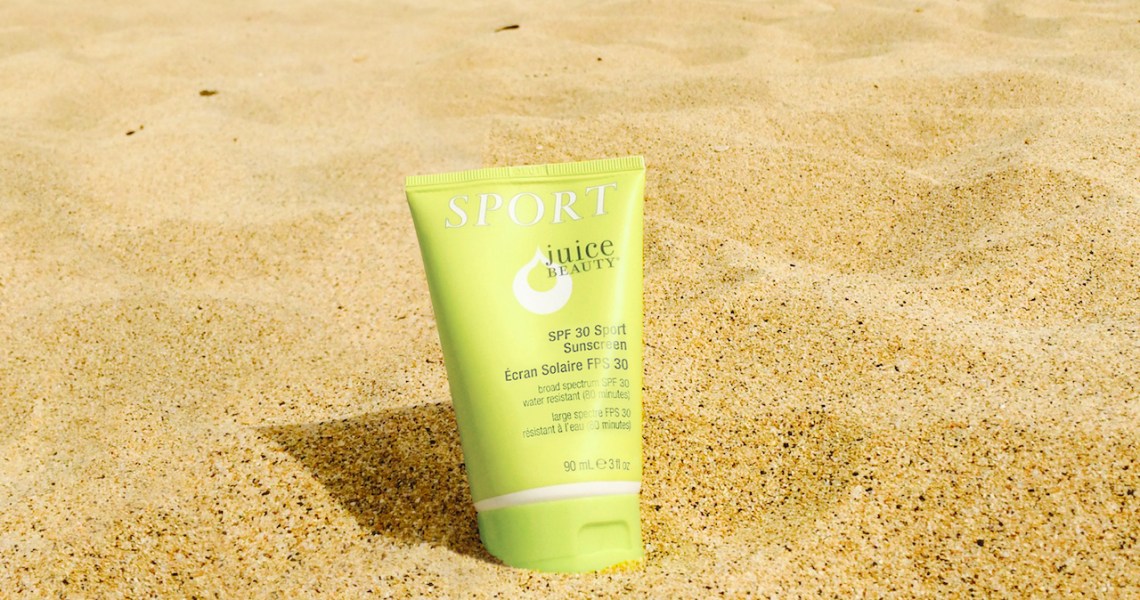U.S. consumers may not be taking tropical vacations anytime soon, but brands are still betting they will wear SPF this summer, both outdoors and indoors.
With few travel opportunities and beaches closed, overall sunscreen sales have been declining during the Covid-19 shutdown. According to Nielsen, sunscreen saw a 17% decline in the week ending March 14 as brands lost out on spring break sales. Coronavirus has spurred a disruption to a previously healthy market: Last year, the global sun protection market was forecasted to grow at a compound annual growth rate of 7% over the next decade, according to market research firm Fact.MR.
“Right now, we would be in the thick of the sun season kicking off,” said Catie Wiggy, the vp of marketing and product innovation for dermaceutical brand MyChelle, noting that the brand has now pivoted to online sales. “Online, we’re doing fine, but in stores and what we’re shipping out to brick-and-mortar, we feel the impact and have seen a 13% decline.”
While beauty brands conduct geotargeted SPF marketing in sunny areas year round, they generally start ramping up their sunscreen campaign season in the U.S. around the spring break period in March — the month the U.S. was shut down. May, which was named Skin Cancer Awareness Month to get consumers to think about skin protection going into summer, is another big month for sunscreen sales. In addition to online campaigns, brands’ SPF products are generally featured front and center on physical store shelves to gear up for summer.
Though SPF was previously tied almost exclusively to seasonal sunscreen, in the last few years it has been treated as an everyday skin-care ingredient. As a result, brands are doubling down on beauty products containing SPF as opposed to offering thick sunscreens to be slathered on at the beach.
MyChelle’s best-selling Sun Shield Liquid Tint with SPF 50, for example, has still seen double-digit growth during the quarantine period. It has seen 60% sales growth since March and 20% growth in the last 30 days.
Juice Beauty, a clean beauty brand that heavily promotes SPF in skin-care products, is also maintaining online growth of its sun-protective skin-care sales. The brand’s online sales of SPF products saw a 30% increase year-over-year in March and April.
“We definitely consistently speak to SPF as a part of your daily skin-care regimen,” said Juice Beauty head of marketing Ann Leahy. “Even if you’re driving to the market, and you might have to wait in line, we want you to make sure that you’re protecting your skin.”
In light of coronavirus, brands are dually shifting messaging to focus on wearing SPF indoors to avoid UV rays coming through glass windows, as well as to protect from blue light from screens.
Lumasol, a new SPF tech startup launched by Sophia Hutchins, the manager of Caitlyn Jenner, was originally set to launch in April but launched May 1 due to Covid-19 shutdowns.

“We pivoted a lot on our messaging to be more sensitive to the environment we were in, [moving away] from ‘Beach with lots of friends playing volleyball’ or ‘Pool party’ or ‘Pool day with friends’ — those types of environments where people really associated sunscreen almost as a social product,” said Hutchins. “Our messaging shifted to, ‘You need to wear SPF while you’re indoors.’”
Often associated with fun days at the beach or pool, SPF brands are also shifting their typically lighthearted messaging. Sun Bum, for example, had been planning to repeat a banana suit campaign it did last year, which was a skin cancer awareness challenge that encouraged social media followers to wear a banana costume and post a graphic about checking for skin cancer. The brand shifted its messaging when the crisis it.

“We started thinking, ‘OK, so we the banana suit challenge doesn’t make sense; it doesn’t feel like the right thing.’ Still, though, we wanted to talk specifically to our mission of safety and protection,'” said Ashley Aron, the vp of marketing at Sun Bum. It instead launched a social media campaign encouraging people to go outside for their health and is now focusing on CSR initiatives. It also created a “Sunshine Live Chat” on its site, where customers can chat with staff members. Aron said the best-selling products on the website right now are Sun Bum’s hand sanitizer and hair products.
Supergoop!, meanwhile, is promoting products to protect against blue light on social media, especially its blue light-focused Unseen Sunscreen.
“We know sunlight still comes through the windows of a home office, and many of our formulas include blue light protection, a benefit we’ve seen an increased demand for,” said Supergoop! president Amanda Baldwin via email. She noted that, “Many of us rely on our screens more than ever.”
“We have been educating our community on the effects of blue light radiation emitted from mobile phones and computers,” said Tracy Ahearn, the founder of Aú Natural Skinfood via email.
Despite the fact that people are homebound, brands are betting that consumers will still be using sunscreen for outdoor activities even if they are not headed to Aruba.
“I think people are going to be outside and are going to try to be active,” said Aron. “Protecting your skin is still going to be very important. The hardest part for all of us is the lack of travel.”
“Consumers in general are going outside, still today, even though we’re in a lockdown,” said Hutchins. “Going outside just looks different; they’re not going outside to a pool party, but people are going outdoors.”




